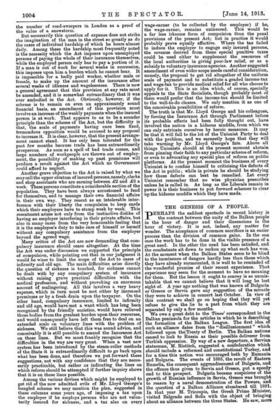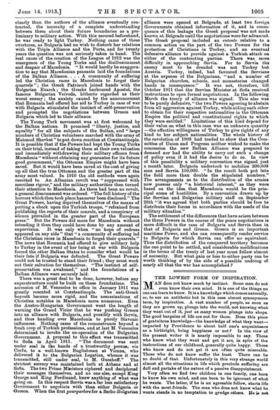THE GENESIS OF A PEOPLE.
PERHAPS the saddest spectacle in recent history is the contrast between the unity of the Balkan people in the hour of danger and their dissensions in the hour of victory. It is not, indeed, any matter for wonder. The acceptance of common sacrifices is an easier process than the division of common gains. In the one case the work has to be done in the visible presence of a great need. In the other the need has been satisfied, and the combatants sit down to reckon up what each has won. At the moment when the Balkan States seem to be blind to the imminence of dangers hardly less than those which they have already surmounted, it is well to be reminded of the wonderful promise of their recent experience. That experience may seem for the moment to have no meaning for them. But the lesson it ought to convey is so unmis- takable that we cannot believe that it will long be lost sight of. A year ago nothing that was known of Bulgaria or Greece or Servia gave any suggestion of the miracle they were to achieve in concert last October. In view of this contrast we shall go on hoping that they will yet refuse to give the lie to a past from which they are separated by only a few months. We owe a great debt to the Times' correspondent in the Balkan peninsula for the articles in which he is describing the formation of the Balkan League. The first idea of such an alliance dates from the " disillusionment " which followed upon the Treaty of Berlin. The Balkan nations ceased to look to Russia as their possible deliverer from Turkish oppression. By way of a new departure, a Servian statesman, M. Ristitch, suggested a confederation which should include a reformed and constitutional Turkey, and for a time this notion was encouraged both by Rumania and Bulgaria. The events of 1885, the revolt of Eastern Rumelia, the consequent aggrandisement of Bulgaria, and the offence thus given to Servia and Greece, put a speedy end to this prospect. Bulgaria became suspicious of the growth of Russian influence in Servia, Greece was brought to reason by a naval demonstration of the Powers, and the question of a Balkan Alliance slumbered till 1891. In that year M. Tricoupis, the Greek Prime Minister, visited Belgrade and Sofia with the object of bringing about an alliance between the three States. He saw, more clearly than the authors of the alliance eventually con- tracted, the necessity of a complete understanding between them about their future boundaries as a pre- liminary to military action. With this secured beforehand, he was ready to fight Turkey. Nothing came of these overtures, as Bulgaria had no wish to disturb her relations with the Triple Alliance and the Porte, and for twenty years the question was not seriously taken in hand. The real cause of the creation of the League of 1912 was the emergence of the Young Turks and the disillusionment and despair of Macedonia. " It would hardly be exaggera- tion to say that Macedonian peasants laid the foundations of the Balkan Alliance. . . . A community of suffering led the Christian races in Macedonia to forget their quarrels " ; the Greek Patriarch joined hands with the Bulgarian Exarch ; the Greeks harboured Apostol, the famous Bulgarian Voivode, hitherto regarded as their worst enemy ; the anxiety- caused by the announcement that Rumania had offered her aid to Turkey in case of war with Bulgaria stimulated the instinct of iself-preservation and prompted the negotiations between Greece and Bulgaria which led to their alliance.
The Young Turk movement was at first welcomed by the Balkan nations. It promised " liberty, justice, and equality " for all the subjects of the Sultan, and " large numbers of Christian volunteers marched with the army of Mahmud. Shevket " to put down reaction at Constantinople.
It is possible that if the Powers had kept the Young Turks on their trial, instead of taking them at their own valuation and immediately withdrawing their military officers from Macedonia " without obtaining any guarantee for its future good government," the Ottoman Empire might have been saved. But it would have been saved at the cost of giving up all that the true Ottoman and the greater part of the army most valued. In 1910 the old methods were again resorted to. An Albanian revolt was " suppressed with merciless rigour," and the military authorities then turned their attention to Macedonia. As there had been no revolt, a general disarmament was ordered. "The full history of the horrors which then took place has never been disclosed." The Great Powers, having deprived themselves of the means of putting a check upon the Turkish troops, " refrained from publishing the reports of their consuls, and a conspiracy of silence prevailed in the greater part of the European press." But the Powers did more for Macedonia without intending it than they could have done by any amount of supervision. It was only when " no hope of redress appeared on any side " that " a community of suffering led the Christian races in Macedonia to forget their quarrels."
The news that Rumania had offered to give military help to Turkey iu the event of her being at war with Bulgaria forced the other Balkan States to consider what would be their fate if Bulgaria was defeated. The Great Powers could not be trusted to stand their friend ; they must work out their salvation for themselves. "The instinct of self- preservation was awakened," and the foundations of a Balkan Alliance were securely laid.
There was a great deal to be done, however, before any superstructure could be built on these foundations. The accession of M. Venezelos to office in January 1911 was greatly resented at Constantinople. The anti-Greek boycott became more rigid, and the assassinations of Christian notables in Macedonia more numerous. Even the Austro-Hungarian Government went the length of warning the Grand Vizier that be was pushing Greece into an alliance with Bulgaria, and possibly with Servia, and thus handing over Macedonia to purely Slavonic influences. Nothing came of the remonstrance beyond a fresh crop of Turkish professions, and at last M. Venezelos determined to invoke the co-operation of the Bulgarian Government. A proposal to this effect was transmitted to Sofia in April 1911. " The document was sent under seal in the hands of a trustworthy person, via Corfu, to a well-known Englishman at Vienna, who delivered it to the Bulgarian Legation, whence it was transmitted, still under seal, to M. Gueshoff." The strictest secrecy was maintained both at Athens and at Sofia. The two Prime Ministers ciphered and deciphered their messages themselves, and no one else, except King George and King Ferdinand, knew anything of what was going on. In this respect Servia was a far less satisfactory Government to negotiate with than either Bulgaria or Greece. When the first yourparlers for a Berbo-Bulgarian alliance were opened at Belgrade, at least two foreign Governments obtained information of it, and in conse- quence of this leakage the Greek proposal was not made known at Belgrade until the negotiations were far advanced. The Greek proposal included an entente relative to a common action on the part of the two Powers for the protection of Christians in Turkey, and an eventual defensive alliance to provide against a Turkish attack on either of the contracting parties. There was more difficulty in approaching Servia. For to Servia the enemy most to be dreaded was not Turkey but Austria. Turkey, indeed, had favoured the Servians at the expense of the Bulgarians, " and a, number of Bulgarian churches, schools, and monasteries changed hands in consequence." It was not, therefore, till October 1911 that the Servian Minister at Sofia received instructions to open formal negotiations. In the following March the treaty of alliance was signed. This also was to be purely defensive, " the two Powers agreeing to abstain from all aggression against Turkey, while aiding each other to obtain for their respective nationalities in the Ottoman Empire the political and constitutional rights to which they were entitled." Limitations of this kind depend for their value on what in this case was an unknown quantity —the effective willingness of Turkey to give rights of any kind to her subject nationalities. The whole history of the revolution of 1908 had tended to show that the Com- mittee of Union and Progress neither wished to make the concession the new Balkan Alliance was prepared to demand nor had the ability to carry out such a change of policy even if it had the desire to do so. In view of this possibility a military- convention was signed just a month later. Bulgaria undertook to mobilize 200,000 men and Servia 150,000. "In the result both put into the field more than double the stipulated numbers." The arrangements as to the distribution of the armies now possess only " a historical interest," as they were based on the idea that Macedonia would be the prin- cipal scene of hostilities. By a convention drawn up by the Servian and Bulgarian military staff on September 28th "it was agreed that both parties should be free to distribute their forces in accordance with the needs of the military situation."
The settlement of the differences that have arisen between the three Powers in the course of the peace negotiations is more difficult in the case of Bulgaria and Servia than in that of Bulgaria and Greece. Greece is an important maritime Power, and she can consequently render service to Bulgaria for which Servia, can offer no equivalent. Thus the distribution of the conquered territory becomes the one point to be settled, and considerable modifications in the terms of the treaty of last year must follow almost of necessity. But what gain or loss to either party can be worth thinking of by the side of a possible undoing of nearly all that the war has accomplished ?















































 Previous page
Previous page